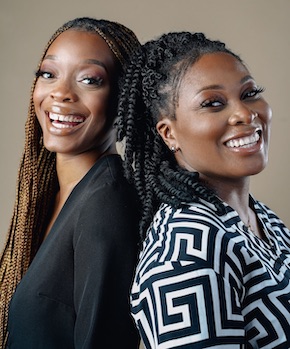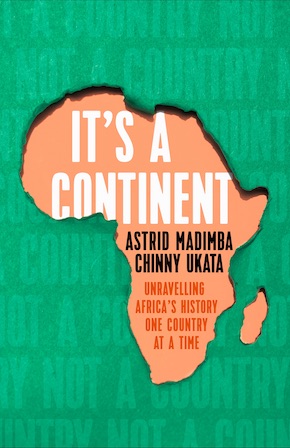Africa uncovered
by Astrid Madimba and Chinny UkataWe launched the It’s a Continent podcast in March 2020. The idea stemmed from us questioning our understanding of the histories of the countries we were from and of the wider continent. Having grown up in the UK (Chinny in Southend-on-Sea and Astrid in Plymouth), our exposure to black history primarily focused on African-American figures. We can recall people around us making sweeping generalisations of Africa, more often than not likening the continent to a country. This deficit in our experiences led us to create a space to educate ourselves and others on the rich history of African nations.
Since launching the podcast, it appears to have resonated with many others, with our listenership covering over 170 countries. For example, a listener in Taiwan came across the podcast whilst looking for information on Thomas Sankara – adding that they liked how our coverage was completely different to other Western media outlets. A teacher in South Africa plays our podcast to her students. Another teacher based in the UK now discusses the genocide in Namibia when teaching about World War II. We’ve also had messages from listeners sharing how the podcast has challenged their initial preconceptions of the African continent.
As an independent podcast in an ever-growing soundscape, breaking through is challenging. Gaining recognition from independent magazines and national media such as PodBible and the Guardian has helped introduce It’s a Continent to new audiences. Social media has also driven our growth – it’s incredible to see our content impacting different people. The tone of the podcast is the main draw for our audience. We cover topics in a light and informative way whilst toeing the line between darker subject matter. Ultimately we select topics that have been under-represented or untold within the curriculum – things we didn’t learn in school.
We script our podcast episodes to some degree, so an equivalent level of research was required for the accompanying book. However, the flexibility of the podcast allows us to be reactionary. We can cover topics discussed in the news and curate content with suggestions from our listeners. We’ve even had a situation where a listener who researched the Chagos Islands sent us sources for us to investigate and pull an episode together. We enjoy co-creating content in this way, and for us it reinforces the need for such a platform.
We cover topics in a light and informative way whilst toeing the line between darker subject matter. Ultimately we select topics that have been under-represented or untold within the curriculum – things we didn’t learn in school.”
We approached writing the book differently as we wanted to ensure we had a good representation of pre-colonial times, independence movements and modern history. We touch on pre-colonial figures such as Angola’s Queen Nzinga, Samory Touré of Guinea and Madam Yoko of Sierra Leone. We also recognise Africa’s contribution to the modern world in Kenya’s Wangari Maathai, Burkina Faso’s Thomas Sankara and South Africa’s Steve Biko.
Colonisation played a critical role in shaping the African continent, and it’s something we do cover. However, we wanted to ensure the book does not repeat the same story across different countries. We intentionally centred on African historical figures and did not focus on the viewpoint of colonists – all the profiles covered within the book are Africans. On the podcast, we covered the Democratic Republic of Congo (DRC)’s exploitation overseen by King Leopold II of Belgium. In the book, we have included other, lesser-known examples of European conquest and rule, such as the plight of Lusophone Africans who lived under nightly curfews, and the build-up to Algeria’s fight for independence from France. We also profile African despots who started as freedom fighters but descended into autocracy, with the likes of Zimbabwe’s Robert Mugabe, the DRC’s Mobutu and Hastings Banda of Malawi all following this path. The parallels between these leaders’ disregard for the people they were supposed to govern are very similar to how Europeans previously subjugated that same population.
The most challenging part of hosting a podcast and writing a book has been managing these two spinning plates whilst also having full-time jobs. At times we had to research different topics for the same country and carry on recording and producing. Did we mention there was also a pandemic?
It’s a Continent provides a starting point for learning about Africa’s nations. You’ll gain a better understanding of how African and European histories are intertwined beyond colonisation, the roles African women have played in different nations, and an appreciation for this relatively youthful continent where many countries have only been independent for just over 60 years. We hope these stories resonate with you and encourage you to continue discovering – because African history is everyone’s history.
 Astrid Madimba and Chinny Ukata are the co-founders and hosts of the It’s a Continent podcast, which was recognised as one of Spotify’s Top 25 history podcast in 2020, and has been mentioned in the Guardian, BBC Radio and PodBible. Astrid was born in the Democratic of Republic of Congo and grew up in the UK. She studied at the University of Exeter and is a marketing professional by day. Chinny is British-Nigerian and studied at the University of Southampton. Her previous work has featured in publications including gal-dem and Black Ballad. It’s a Continent: Unravelling Africa’s History One Country at a Time, is published by Coronet in hardback, and also available in eBook and audio download, read by Astrid and Chinny.
Astrid Madimba and Chinny Ukata are the co-founders and hosts of the It’s a Continent podcast, which was recognised as one of Spotify’s Top 25 history podcast in 2020, and has been mentioned in the Guardian, BBC Radio and PodBible. Astrid was born in the Democratic of Republic of Congo and grew up in the UK. She studied at the University of Exeter and is a marketing professional by day. Chinny is British-Nigerian and studied at the University of Southampton. Her previous work has featured in publications including gal-dem and Black Ballad. It’s a Continent: Unravelling Africa’s History One Country at a Time, is published by Coronet in hardback, and also available in eBook and audio download, read by Astrid and Chinny.
Read more
itsacontinent.com
Instagram: itsacontinentpod
Twitter: @itsacontinent
@coronetbooks
Portrait of the authors © Joseph Osayande


